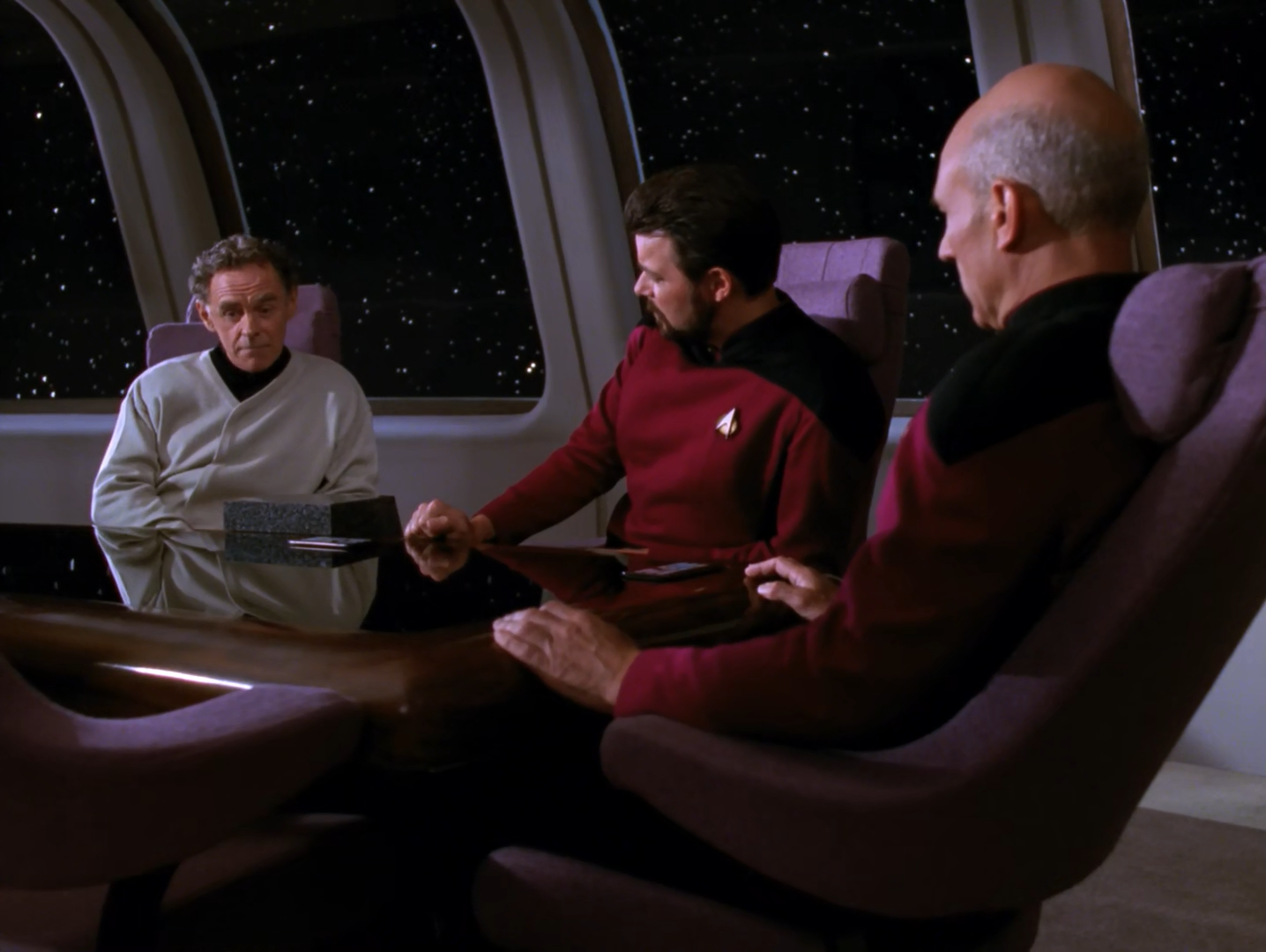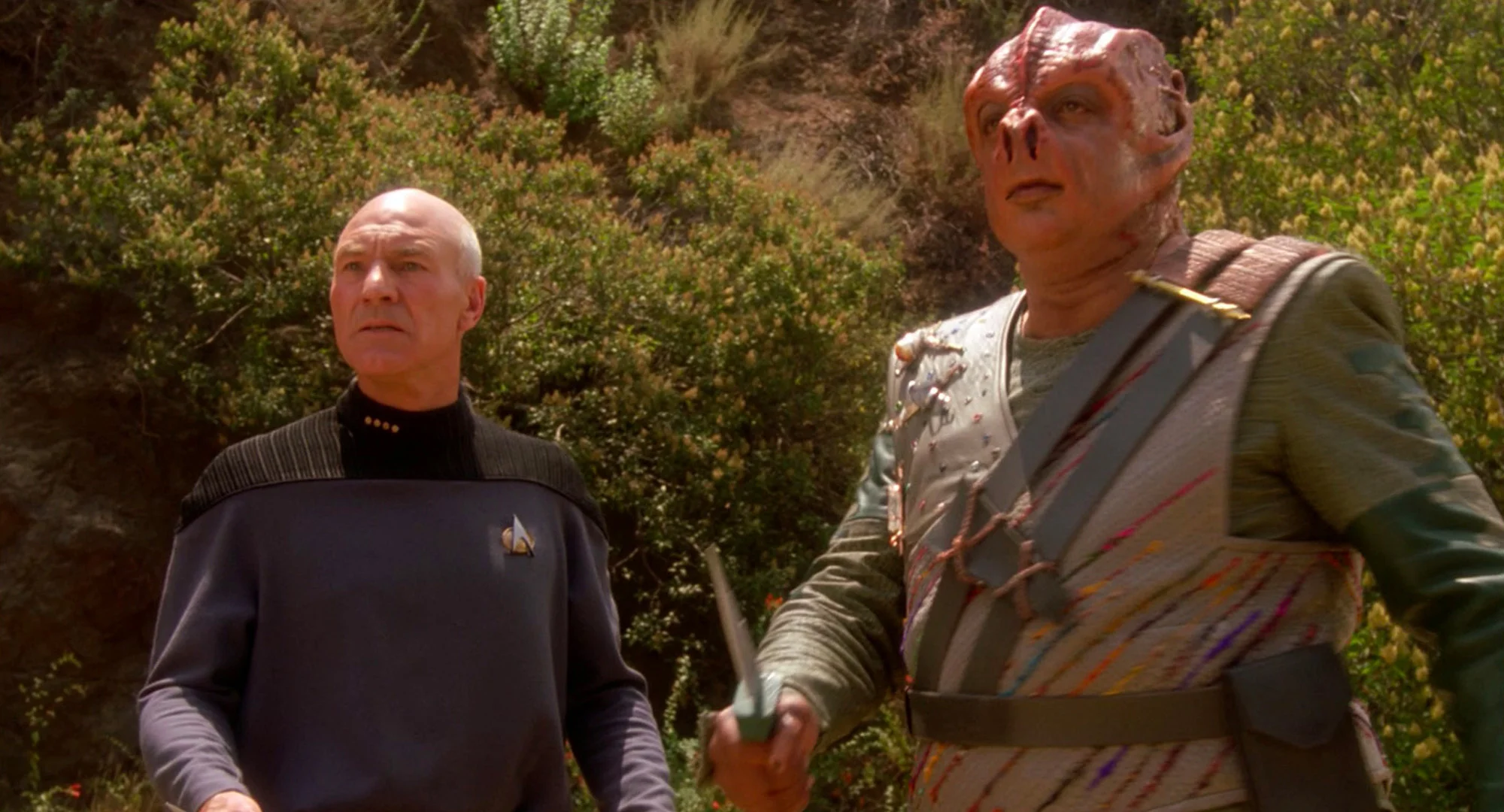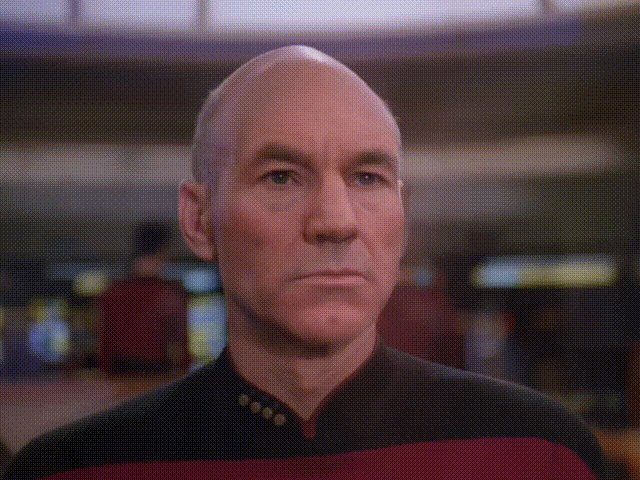How Star Trek: Next Generation is so refreshing to watch
Nowadays, sci-fi is my go-to genre when picking up new media to consume. I’ve been enjoying the “what if” exercise sci-fi stories usually propose, and I get really engaged in imagining myself in the different settings. I find it particularly interesting to reflect on how different would my beliefs and actions be when conflicted in these settings of esoteric technology and culture.
During lockdown, I finally got around to watching some material of the Star Trek franchise. The truth is I had watched a few episodes of the original series (TOS), but they didn’t really appeal to me. Consequently, I went for Next Generation (NG). My expectations were low, not only because of my past experience with TOS, but also because I used to not expect much from “older sci-fi”. I was pleasantly surprised with this series.
NG started airing during a time of great social and political changes, and it shows. Saying the range of topics tackled is broad is an understatement. In NG one can find takes on ecoterrorism, cultural differences, handling war with conflict, handling war with diplomacy, gender identity, social justice, societal response to scientific breakthroughs, among many others. The topic depth is huge, and many episodes deserve a deep review. For this essay, I want to write a bit about three of my favorites.
Who watches the watchers
A research team is installed in a planet inhabited by a humanoid species at bronze age level stage of evolution. The outpost is concealed in order to not interfere with the evolution process of this species, but that is interrupted when an equipment malfunctions and an explosion injures the research team and a roaming inhabitant named Liko.
The Enterprise is in charge of damage control, and ends up using their technology to save this inhabitant. This is heavily against the premise of not interfering with alien species in cultural development, which they call “Prime Directive”.
Liko is then returned unconscious to the planet, but it turns out he had momentarily gained consciousness during treatment. In those moments, an image of Picard was left imprinted on his mind, which leads him to identify the episode as a meeting with a god in the afterlife. This escalates quickly and Liko is soon acting like a messenger of a new cult.
Picard is now left with a very hard dilemma, the Enterprise can either: leave this species as is, allowing them to shape their society around this newly born religion; or reveal themselves and explain what is happening and why this religion is a mistake.
 Dr. Barron, Riker and Picard discuss how to damage control the situation.
Dr. Barron, Riker and Picard discuss how to damage control the situation.
Dr. Barron: Well, they are not normally a violent people, All we can do now is minimize it.
Riker: By sanctioning their false beliefs?
Dr. Barron: By giving them guidelines. Letting them know what the Overseer expects of them.
Picard: Dr. Barron, I cannot -- I will not impose a set of commandments on these people. To do so violates the very essence of the Prime Directive.
Dr. Barron: Like it or not, we have rekindled the Mintakans' belief in the Overseer.
Riker: And are you saying that this belief will eventually become a religion?
Dr. Barron:` It's inevitable. And without guidance, that religion could degenerate into inquisitions, holy wars, chaos.
Picard: Horrifying.
This means that they will unavoidably be shaping this species, which is a huge breach of the “Prime Directive” already. This society will inevitably have been polluted with external contact, which, for example, we humans have not - as far as we know.
Picard ends up going for the latter choice, leveraging his choice on the fact that this species reportedly had already moved on from believing in the supernatural. Still, the thought of possibly having wars waged in his name and being a worshiped figure seemed to embarrass Picard This was shown when he was seemingly ashamed when an alien bows to him.
All ends well with a faction of the alien species meeting Picard, who explains the situation. The Enterprise now leaves in hopes the myth of Picard remains asleep in this developing species.
Even though this episode comes up a lot when downplaying religion, I want leave a more hopeful note. Religions on Earth has also helped our society greatly in establishing common grounds and agreeing to a “cooperation manual”. Only with this cooperation were we able to set some differences aside and work our way up the Maslow’s pyramid and improve our quality of life and work on new technologies.
Darmok
In a TV series documenting the voyages of a starship meeting and interacting with multiple alien species, the “universal translator” plot device is pretty useful for the writers. As such, an episode dedicated to figuring out how to communicate with a new species is not common. I found it very interesting and engaging precisely due to this.
The episode introduces the Tamarians, a species that had already been identified, but with whom previous encounters proved unfruitful as communication was not possible. When the crew interacts with the Tamarians, we learn they use syntactically understandable sentences, but what they mean by them is impossible to grasp. Some examples include: “Temba, his arms wide” or “Darmok and Jalad at Tanagra”.
In an awkward turn of events, the Tamarian captain transports both Picard and himself to nearby planet inhabited by an alien beast. This is can be easily interpreted as an hostile act of war, yet the Tamarians don’t follow up with any further attack, they simply insist on keeping both their captain and Picard on the planet.
 Picard has to learn to communicate with an alien species to improve his chances of survival.
Picard has to learn to communicate with an alien species to improve his chances of survival.
Even when surrounded with so much technology, so much experience, the crew feels helpless when interacting with this species, and without proper communication they can't solve the stalemate. Misunderstandings are historically initiators of aggression and potentially wars, something the crew can’t afford while their captain is being held hostage.
During an encounter with the beast, Picard eventually understands the central idea of their communication: imagery. Their sentences invoke a character, a story, an action. That’s the gist of it: they express themselves through moments and feelings invoked in a scene of a story. Some examples can be reviewed here. While they finally - limitedly - understand each other, it comes at a great cost as the Tamarian is badly injured in the fight with the beast.
While sitting down with the injured Tamarian, Picard learns more Tamarian stories and finally understands the original plan behind stranding them in the planet. The idea was to reproduce the “Darmok and Jalad at Tanagra”, where strangers became friends by joining force in defeating a beast. Picard repays by telling a story of his own people: The Epic of Gilgamesh. A fitting story. Unfortunately, the Tamarian captain dies during the night, but the mission was complete.
This was a very unique episode that explored communication and understanding. As a final note regarding this episode, I wanted to address how efficient the Tamarian communication is. The very short lines depicting a character in a single scene include a great amount of information: not only the backstory and personality of the character, but also the feelings and actions on a particular place. Imagery is truly powerful.
Yesterday’s Enterprise
This is a personal favorite take on time-travel. There isn’t really any of the societal themes I mentioned earlier, it is just a case of beautifully written episode where different actions and reactions come round the end to tie up a story perfectly.
In this episode, the Enterprise encounters some “sci-fi mumbo jumbo” and while analyzing it, they run into an older ship that was believed to have been destroyed in a war two decades earlier. Suddenly, the timeline shifts and the Enterprise goes through some changes, for instance, some main crew changes (including the revival of the previously deceased Lt. Tasha Yar) and the ship is now following war procedures as it is no longer on a deep space exploration mission. This alternative reality setting is never explicitly explained to the viewer and some aspects are only understood further down the episode.
 The timeline shift is followed by a color palette change that accentuates the setting differences.
The timeline shift is followed by a color palette change that accentuates the setting differences.
I am a big fan of this “show don’t tell” approach, the viewer is given the opportunity to “solve a puzzle” to understand what is going in their own terms. Since this is a very episodic show, everything would have to end up without big changes to the show setting and crew dynamics, but what I was watching was so far away from it! At some point I thought the episode had improvised itself into a corner, fortunately I was very wrong. Everything ended up with no loose ends and everything made sense - for Star Trek standards - and I got a satisfying ending.
This was also a great opportunity to explore the characters in a very different psychological setting, we got to see how the characters would behave if they were conditioned by war. As expected, the changes are not subtle, the stress and anxiety are palpable and there is much more tension and impatience in the interactions.
The characters are still loyal to their beliefs, but you can see that war has taken a dent on them. For instance, I can’t even begin to fathom the uneasiness of being the captain of a war ship, with thousands of people at your command in the midst of a conflict, with very tough decisions to make. This was not sugarcoated, the calm, collected and diplomatic Picard that we were used to is also very conflicted. He was still highly dependable and eloquent, but we can see him having trouble coping with the war, mostly because he felt powerless.
Conclusion
By the time I reached the third season, I realized that I should have picked up older TV shows sooner. Ironically, NG was really refreshing for me, because it did a lot of things differently from the media that I am used to. More recent productions tend to go more with prolonged action scenes, special effects and witty remarks for comic relief, which I’m not a fan of. There is nothing inherently wrong with this approach, I guess I grew tired of them. In NG I was not spoon-feed explanations or the motifs of the different characters and factions, I was given time to analyze and to try to understand what was at stake in each episode.
I didn’t get hooked in the first minute or even in the first season, but it was my go-to choice when I wanted to relax a bit. Slowly, the characters grew on me and I found myself looking forward to watch more episodes. I wanted to watch more adventures about these characters and I wanted to listen to Picard’s widsom.
I highly recommend ST:NG. This is a show that displays how to use science and diplomacy to find solutions. A big part of it includes finding a balance between rationality and emotions. Thanks to this, I feel like I now understand better certain ethical conflicts and how deliberation and compromise go a long way to make one more empathetic and tolerant.